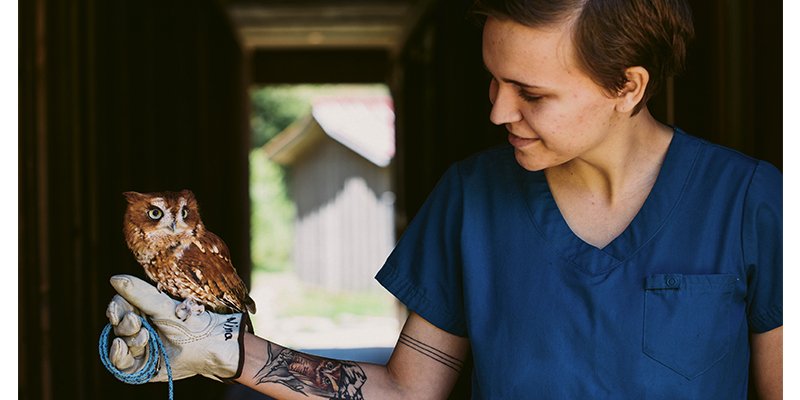Experiential Education
Experiential Education: Science
PHOTO: As part of Lees-McRae’s Wildlife Biology program, graduating senior Erin Christian gets close encounters with native wildlife, including this eastern screech owl named Oz.
Getting Wild with Biology - Lees-McRae College
For Wildlife Biology students at Lees-McRae, most courses have a field component and some even take place entirely outside. The entry-level Field Biology course, for example, takes students to the Elk Valley Preserve every week, where they study salamanders, insects, and small mammals, analyze the data, and produce real reports, just like they would for a state agency. The on-
campus May Wildlife Rehabilitation Center takes in some 1,500 injured and orphaned animals annually, providing plenty of experience for students pursuing a concentration in wildlife rehabilitation.
Following the Voice of the Rivers - Brevard College
During the annual Voice of the Rivers Expedition, an interdisciplinary squad of students and faculty follow a river from source to sea, documenting their journey via social media and blogs. As they paddle across the rocky beds of rivers like the Broad (each trip follows a different waterway), students engage with the creatures that call the river home. “Students gain a better understanding of the significance our rivers have to the communities and cities that they pass through,” notes Clyde Carter, professor of Wilderness Leadership and Experiential Education.
Partnering with PARI - Brevard College
The National Science Foundation recently awarded Brevard College and the Pisgah Astronomical Research Institute, a nearby nonprofit, a grant to spur STEM studies at the liberal arts school. Students in the new introductory courses will use remote rovers (think moon mobiles with robotic arms) to take samples and study the flora, fauna, and water quality of a plot of land in Pisgah National Forest. With PARI’s help, tools designed for space exploration will expand the college’s earthly experiential learning.
Studying from the Mountains to the Sea - Western Carolina University
It may seem strange to study the coast from a mountain campus, but in our modern world, it’s increasingly possible. WCU’s Program for the Study of Developed Shorelines is a nationally recognized resource for coastal study, and it’s based right here. A select group of the university’s students make an annual pilgrimage to the East Coast, where they work as research assistants, contributing to projects that affect national policy and earning a nod on scientific papers.
Harvesting a Bounty of Knowledge - Brevard College
There’s a demand for agricultural education in high schools, but without a foundation in the relevant science and only a book for backup, even the most eager of teachers can flounder at delivering the goods. That’s why Brevard founded its Agricultural Education Program last fall. As it takes root, students will gain experience through field trips, an on-campus greenhouse, and partnerships with local producers, including some who specialize in building and maintaining rooftop beehives. Participants will snag a state Teaching Certification in Agriculture Education, so the scholarly cycle can continue.
Reading the Bones - Western Carolina University
Forensic anthropology students take a Sherlockian look at decomposition through the Forensic Osteology Research Station (FOReSt) at WCU, one of six such facilities in the country. They take to the woods to study decomposition and skeletal human biology with donated cadavers and analyze remains indoors at the Western Carolina Human Identification Laboratory. Students have worked side-by-side with scientists on undertakings like the Urban Death Project, which seeks the most economical and ecological forms of composting human remains, and even with law enforcement on a true crime case.
